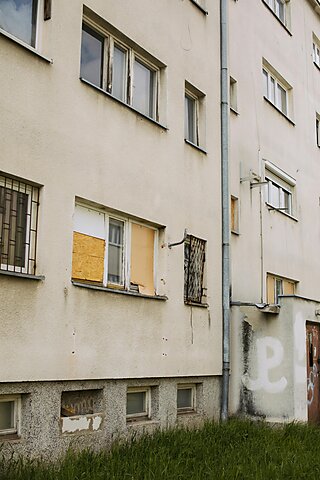A variety of Department of Housing and Urban Development (HUD) programs could use immediate attention from the Department of Government Efficiency (DOGE), and public housing and other supply-side housing subsidies are high on the list.
Public housing has a history of failure, and over the years, government spending on public housing has declined in favor of other programs, such as Section 8 housing vouchers, which are more flexible and direct in helping low-income beneficiaries. But despite public housing’s de-emphasis, the program lives on in all 50 states and the District of Columbia.
That is too bad because public housing is rife with problems: Its history is full of scandal and incompetence, and poor management, safety, and sanitation are a continuing problem. Public housing developments have experienced rat infestations, infrastructure problems, mold, and lead issues. Crime is a continuing problem: Counties with Public Housing Primary Care Health Centers, which serve public housing residents, have 31 percent higher violent crime rates than counties without.
Local housing authorities have managed public housing so poorly that HUD has placed at least 19 troubled housing authorities in administrative receiverships, one of which lasted more than 30 years. Meanwhile, in 2020, the Office of the Inspector General found that an additional 18 troubled public housing authorities should have been referred for federal receiverships but were not due to faulty reporting practices.
The issues continue today: A scathing 2022 HUD report found that Washington, DC’s public housing is dangerous and unsanitary, plagued by low occupancy (25 percent of units vacant) yet with a waiting list nearly 25,000 people long. In New York City, years of neglect and mismanagement resulted in a federal monitorship, but five years later, there is still “a long way to go” toward overcoming pervasive problems, including toxic mold, lead paint, rat infestations, and yearlong-plus waits for unit service requests.
Although inept management is an important part of the equation, public housing’s design is to blame for many of its issues. Public housing segregates residents and concentrates poverty, which means residents are isolated from the jobs, schools, and community amenities that could better their lives. Unlike housing vouchers, the benefit is immobile, so residents stay in declining areas, whatever the personal cost. In New York City, the average tenure of a public housing resident is 25 years.
Due to the many problems associated with the model, most American cities have already demolished some of their public housing stock, including such diverse places as Atlanta, New Orleans, Philadelphia, Tucson, and, famously, Chicago; 250,000 public-housing units have been demolished overall.
The federal government should continue to wind down public housing for the sake of tenants and communities. While that may seem like a radical idea, there is precedent across the pond. Over 40 years ago, the UK government gave public housing residents the option to buy their homes at a substantial discount, with the idea that doing so would be an economic boon for tenants while also reducing government dependence.
The “Right to Buy” discount was substantial, reportedly between 44 percent and 70 percent in the late 1980s, and the policy resulted in a considerable conversion of public housing to privately owned homes, with millions of former public housing residents becoming property owners for the first time.
Providing a similar “right to buy” in the United States would give public housing residents a path to independence and homeownership that is otherwise unavailable. It would also create new incentives—currently lacking in government housing—for residents to grow their incomes and savings (income and asset limits could be relaxed for current residents pursuing this option).
Even at a deeply discounted price, units in some high-cost markets would realistically be out of reach for many tenants. In housing markets where public housing is located on highly valuable land, Howard Husock has proposed allowing housing authorities to sell public housing and distribute the sales proceeds to existing tenants.
In high-cost areas like New York, this strategy could provide a financial windfall for current residents. For example, Baruch Houses in New York is valued at $111 million, amounting to $564,000 in sales proceeds per unit.
Tenants would benefit directly through a program like this but could benefit indirectly as well. A highly cited study found that children living in households that were displaced from public housing and provided a housing voucher earned more as adults, were more likely to be employed, had fewer violent crime arrests, and had lower school dropout rates than peers who were not displaced. This indicates that leaving public housing is beneficial, even apart from any direct financial windfall.
When people think of ending public housing, they think of bulldozers and residents left in the lurch. But there are ways to move forward that will benefit tenants and cities alike, and the new administration should consider all the options.

